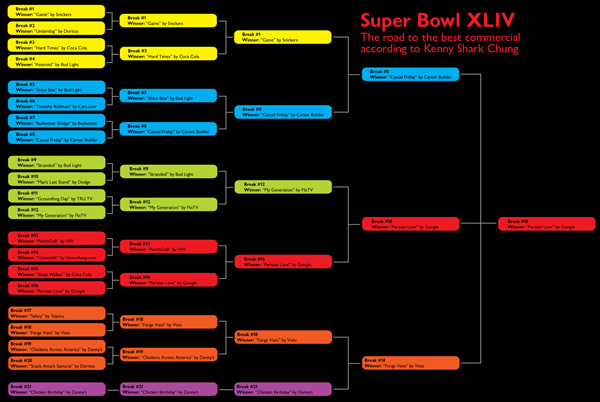“Simpsons” from Coca Cola
Apparently, some people liked this commercial. I found it confusing without any real message. Drinking Coca Cola will make an evil (financially and morally) bankrupt billionaire happy? Is that their target audience? To me, it just seemed like Coca Cola creative didn’t have any real ideas and decided that since The Simpsons is universally recognized, it’d be an easy way to create a very, very costly commercial.
“Charles Barkley” from Taco Bell
Why does this commercial exist? I can see it airing during primetime or late night. But during the Super Bowl?! Why is Charles Barkley the spokesperson for anything? Can somebody please answer that?
“KISS” from Dr. Pepper
First of all, KISS is no longer relevant and the original “Dr. Love” campaign was terrible. So what did Dr. Pepper decide to do? They expanded it and aired it during the Super Bowl. “What’s that, you say? There are midgets little people this time around? Then I’m sure it’ll be a lot better.” Except it wasn’t.
“Life Not Wife” by Bridgestone
This was a real disappointment. They went to great lengths for a pretty corny and forced joke. I liked their Alice Cooper/Richard Simmons ad from last year (or at least didn’t hate it), but this one totally underdelivered and frankly, it was boring.
In the “How The Heck Did They Afford a Super Bowl Spot” category:
“Shape-Ups” by Skechers
This commercial was terrible, but Skechers is a big company. So maybe the question isn’t how they purchased a spot, but WHY? It also featured Joe Montana for some reason. Pass.
“Tech Talk” from Metro PCS
I don’t have a link to this commercial, but trust me, you’re better off for that. It blatantly played off of racial stereotypes. It featured two Indian tech gurus talking about Metro PCS cell phone service. It ended with Indian women dancing around the “contestant” on their talk show. It made very little sense, and probably alienated a lot of people without being the slightest bit amusing. How did they not learn from the whole SalesGenie debacle? Also, how did they afford a Super Bowl spot? Are they really doing that well targeting lower class people?
“Sumo” from kgb
kgb is a service where you text a question to someone and pay a fee for them texting you back the answer. It also started when many people didn’t have Smartphones. Now that almost everyone does, this commercial positioned their product against the slowness of typing a question into a search engine in your browser and having to look through search results to find an answer. How do people do that? That sounds so tedious and pointless and totally sounds like something worth paying someone else to do!
Dishonorable Mentions
CBS had a bunch of commercials advertising their subpar primetime lineup. Last year, NBC also aired a lot of commercials for their shows. Network commercials are a really good indicator of how much advertising budgets have been cut. More CBS commercials means fewer companies purchased Super Bowl spots. There was also an ad featuring David Letterman, Jay Leno and Oprah which I cannot explain.
Who was missing?
In a big surprise, Pepsi pulled out of Super Bowl advertising this year, which reminds me of this little piece of satirical excellence from The Onion. Life imitating art? Perhaps. The real reason is that Pepsi is focused more on online advertising. Maybe this was a godsend for Coca Cola, whose two ads were not particularly great. In the same vein, Anheuser-Busch went uncontested in the beer segment. No Heineken. No Michelob. Are Super Bowl ads not as important, or are they just not worth the cost anymore?


